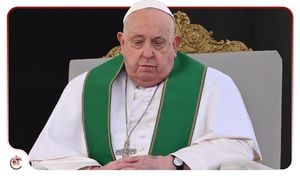The 2025 German Federal Elections are upon us, taking place on February 23, 2025, following the unprecedented collapse of Chancellor Olaf Scholz's government. The elections are reportedly set to be historic, with significant shifts anticipated as voters head to the polls today from 8 AM to 6 PM.
This election is particularly consequential, as it marks the first time Germany will elect its Bundestag, or federal parliament, amid the unanswered questions stemming from the previous ruling coalition’s breakdown. The Scholz-led coalition of Social Democrats (SPD), Greens, and Liberals faltered over economic policies and issues related to the national budget, resulting in early elections.
Current economic conditions weigh heavily on this electoral process. Germany finds itself grappling with recession for the second straight year. This is alarming, considering it is the first such occurrence seen by the country for decades. The industrial powerhouse is facing numerous challenges, including bureaucratic hurdles, skyrocketing energy costs, and struggles within its pivotal automotive industry as it transitions to electric vehicle manufacturing.
The CDU/CSU, led by Friedrich Merz, is poised to emerge as the leading party according to the latest polls, as they seek to reclaim power after 16 years of leadership under Angela Merkel. Merz stands firmly against the economic policies of the outgoing government and has proposed reforming the military, cutting taxes significantly, and reevaluated immigration policies. His party currently enjoys approximately 32% of projected votes.
On the extreme end of the political spectrum, the Alternative for Germany (AfD) party under Alice Weidel is drawing attention as they seek to capitalize on discontent among voters. Known for its strong anti-immigration stance, the AfD has increasingly drawn comparison to populist movements across Europe, riding high with predictions of 20% of the vote thanks to support from notable names like billionaire Elon Musk. Their prospects highlight growing concerns surrounding far-right politics within Germany, especially within former East German territories.
The SPD, meanwhile, faces dire predictions with their polling points to mere 14.5% of voter intention—this is markedly less than they received during the last election. Scholz, the party’s leader and outgoing Chancellor, had hoped to steer the nation through tumultuous times since taking office three years ago, including the systemic challenges brought about by the Russian invasion of Ukraine.
Similar troubles plague the other parties too. The Greens, led by Robert Habeck, are anticipated to secure only 13% of votes, down from their more aspirational positions four years ago. The party’s ambitious climate agenda faltered during their time in government and hasn't regained traction among voters.
When it Comes to Leftist politics, Die Linke is expected to secure between 6% and 7% of votes, potentially establishing themselves back within the Bundestag. Meanwhile, challenges remain for other smaller parties, including digital advocacy groups and those gaining traction on more contentious issues.
The election system remains complex and hybrid. Voters have two votes: the Erststimme is a direct vote for candidates representing single-member districts, and the Zweitstimme determines how seats are apportioned among parties nationwide. Germany requires parties to secure at least 5% of the nationwide vote or win three direct mandates to enter parliament.
Polling stations opened early this Sunday, and as results begin to filter through shortly after 6 PM, political analysts are bracing for outcomes and subsequent coalition dynamics. Expecting anywhere from four to seven parties to gain entry to the Bundestag, all eyes will be on coalition-building strategies when the votes are tallied, especially with the CDU pledging not to align with the AfD factions.
Scholz has stated his plans to request confidence votes before the elections, which creates a pivotal topic of discussion as the nation anticipates the likely shift in government. Should CDU/CSU and AfD capitalize on their polling strengths, this would usher significant changes to Germany’s traditional political fabric.
The ramifications of these elections extend beyond domestic affairs; with urgent discussions surrounding significant constitutional reforms looming, particularly concerning fiscal policies preventing excessive budget deficits. This political maneuvering ties back to the necessity of adapting to new geopolitical realities and economic recoveries.
Election day has officially begun, and with over 60 million citizens eligible to vote, the significant turnout and final tally will shape the country's path moving forward. Many participants, including the elderly demographic, have shown notable interest, emphasizing the need for the government to address the conditions impacting the populace today.
Only time will tell the exact outcome of this highly significant day for Germany as they elect their representatives and determine the helm of their government. With so much at stake, the stakes could not be higher. Every ballot cast today speaks directly to the future direction of this pivotal nation.



